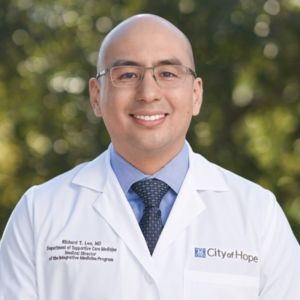The landscape of cancer care is evolving rapidly, with growing recognition that optimal patient outcomes require a whole-person care approach that goes beyond cytotoxic and targeted therapies.
At City of Hope, innovative and holistic care is part of our culture and mission, making integrative oncology a natural fit with our national leadership in whole-person care. Through the Cherng Family Center for Integrative Oncology, we are pioneering a comprehensive, evidence-based approach that aims to reshape how we think about holistic cancer care, supported by research conducted right here at City of Hope.
Building evidence-based clinical programs
The introduction of integrative oncology into established cancer care settings represents a paradigm shift toward creating a more holistic approach by bringing together standard modern cancer care with other traditional therapies, such as practices from Eastern medicine, acupuncture, massage, and the use of herbs and supplements. What distinguishes our approach is our unwavering commitment to evidence-based practice—we focus exclusively on therapies that already have clinical research demonstrating benefit and safety, while simultaneously conducting rigorous research on promising interventions.
The future of oncology lies not in choosing between conventional and integrative approaches, but in thoughtfully combining them through rigorous research and compassionate care delivery.
Our integrative oncology research is gaining significant momentum across our national system, with more than two dozen ongoing studies that have already accrued more than 150 patients in the past year. These studies span basic science to translational and clinical research, addressing critical gaps in our understanding of integrative therapies.
Notable ongoing trials include investigations of cannabis for chemotherapy-induced peripheral neuropathy, studies examining different meditation approaches for cancer survivor anxiety, and aromatherapy interventions to reduce pain and anxiety during bone marrow biopsies and chemotherapy infusions. We’re also conducting prospective research on massage therapy during chemotherapy infusion, building on our pilot program that has already treated more than 250 patients.
Early results from our massage therapy pilot are encouraging, showing significant improvements in pain, neuropathy, anxiety, fatigue, mood and overall well-being. These findings support our hypothesis that integrative therapies can be seamlessly woven into standard cancer care delivery, enhancing rather than replacing conventional treatment approaches.
Our clinical and supportive care services are currently piloted at both our Los Angeles and Orange County locations, offering integrative oncology consultations, acupuncture, oncology massage, music therapy, and mind-body services. We provide both individual and group programs—including yoga, qigong, meditation, and drumming classes specifically tailored for cancer patients. Many of these services are available online, ensuring accessibility for patients who cannot travel to our centers.
A key differentiator in our approach is the integration of these services directly into standard care workflows. For example, patients receiving chemotherapy can simultaneously receive an oncology massage during their infusion, transforming what is often an anxious, uncomfortable experience into a more therapeutic and restorative one.
Future vision and impact
Our recent survey of major comprehensive cancer centers revealed that only about half provide any integrative therapies for cancer patients, with even fewer offering dedicated integrative oncology services. This highlights significant barriers to widespread adoption, including limited access to appropriately trained providers and lack of insurance coverage due to insufficient evidence.
We’re addressing these challenges through comprehensive education initiatives at all levels—from patients and community members to clinicians and trainees. This summer, we launched one of the first integrative oncology fellowships created and led by oncologists. The three-year program is integrated with our hematology-oncology fellowship, representing a crucial step in building the next generation of integrative oncology practitioners.
The benefits of integrative oncology will be extended to patients throughout City of Hope’s national cancer care and research system. In 2026, we plan to expand our programs to our Chicago, Atlanta, and Phoenix locations, creating a truly national enterprise that combines comprehensive clinical and supportive care services with research. Our ultimate goal is ambitious but achievable: to generate high-quality clinical trial data that will be incorporated into national guidelines from organizations like the American Society of Clinical Oncology and the National Comprehensive Cancer Network, establishing integrative therapies as part of standard cancer care.
The future of oncology lies not in choosing between conventional and integrative approaches, but in thoughtfully combining them through rigorous research and compassionate care delivery. At City of Hope, we are committed to leading this transformation, ensuring that every cancer patient has access to the full spectrum of evidence-based therapies that can improve their outcomes and quality of life.
City of Hope® is one of the largest and most advanced cancer research and treatment organizations in the U.S., with its National Medical Center named top 5 in the nation for cancer by U.S. News & World Report. To learn more about City of Hope, visit: www.cityofhope.org.
Discover the latest innovations in cancer research on City of Hope’s new podcast, “On the Edge of Breakthrough: Voices of Cancer Research.” Available on Spotify, Apple Podcasts and at cityofhope.org/edge-of-breakthrough.









